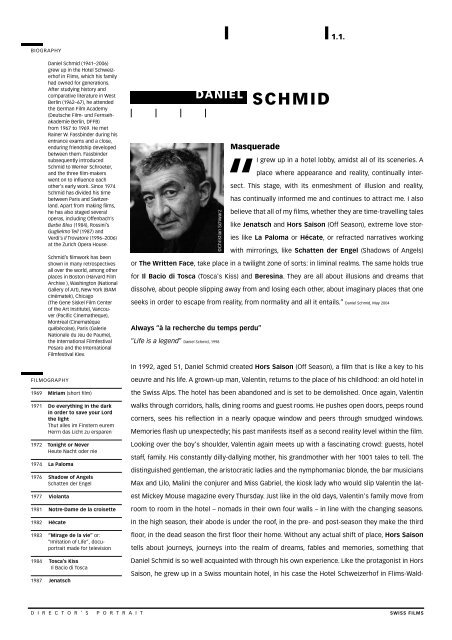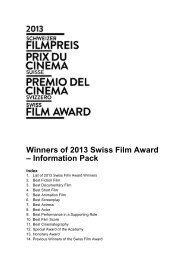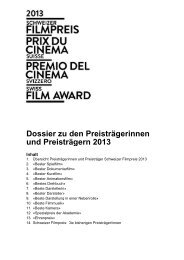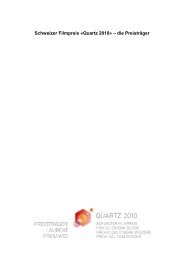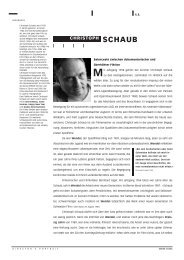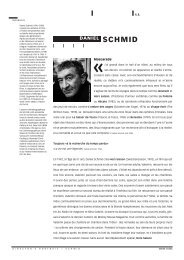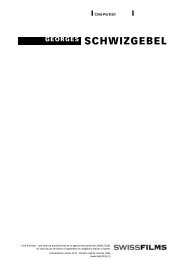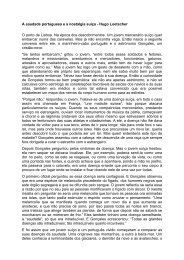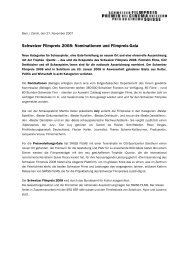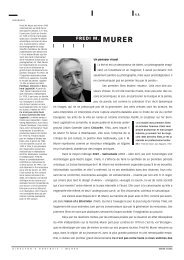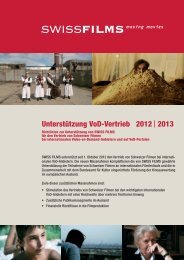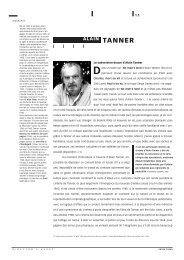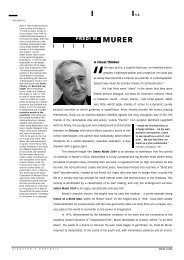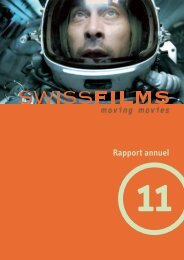Director's Portrait Daniel Schmid - Swiss Films
Director's Portrait Daniel Schmid - Swiss Films
Director's Portrait Daniel Schmid - Swiss Films
You also want an ePaper? Increase the reach of your titles
YUMPU automatically turns print PDFs into web optimized ePapers that Google loves.
BIOGRAPHY<br />
<strong>Daniel</strong> <strong>Schmid</strong> (1941–2006)<br />
grew up in the Hotel Schweizerhof<br />
in Flims, which his family<br />
had owned for generations.<br />
After studying history and<br />
comparative literature in West<br />
Berlin (1962–67), he attended<br />
the German Film Academy<br />
(Deutsche Film- und Fernsehakademie<br />
Berlin, DFFB)<br />
from 1967 to 1969. He met<br />
Rainer W. Fassbinder during his<br />
entrance exams and a close,<br />
enduring friendship developed<br />
between them. Fassbinder<br />
subsequently introduced<br />
<strong>Schmid</strong> to Werner Schroeter,<br />
and the three film-makers<br />
went on to influence each<br />
other’s early work. Since 1974<br />
<strong>Schmid</strong> has divided his time<br />
between Paris and Switzerland.<br />
Apart from making films,<br />
he has also staged several<br />
operas, including Offenbach’s<br />
Barbe Bleu (1984), Rossini’s<br />
Guglielmo Tell (1987) and<br />
Verdi’s Il Trovatore (1996–2006)<br />
at the Zurich Opera House.<br />
<strong>Schmid</strong>’s filmwork has been<br />
shown in many retrospectives<br />
all over the world, among other<br />
places in Boston (Harvard Film<br />
Archive ), Washington (National<br />
Gallery of Art), New York (BAM<br />
cinématek), Chicago<br />
(The Gene Siskel Film Center<br />
of the Art Institute), Vancouver<br />
(Pacific Cinematheque),<br />
Montreal (Cinematèque<br />
québécoise), Paris (Galerie<br />
Nationale du Jeu de Paume),<br />
the International Filmfestival<br />
Pesaro and the International<br />
Filmfestival Kiev.<br />
FILMOGRAPHY<br />
1969 Miriam (short film)<br />
1971 Do everything in the dark<br />
in order to save your Lord<br />
the light<br />
Thut alles im Finstern eurem<br />
Herrn das Licht zu ersparen<br />
1972 Tonight or Never<br />
Heute Nacht oder nie<br />
1974 La Paloma<br />
1976 Shadow of Angels<br />
Schatten der Engel<br />
1977 Violanta<br />
1981 Notre-Dame de la croisette<br />
1982 Hécate<br />
1983 “Mirage de la vie” or:<br />
“Imitation of Life”, docu-<br />
portrait made for television<br />
1984 Tosca’s Kiss<br />
Il Bacio di Tosca<br />
1987 Jenatsch<br />
D I R E C T O R ’ S P O R T R A I T<br />
I grew up in a hotel lobby, amidst all of its sceneries. A<br />
place where appearance and reality, continually inter-<br />
sect. This stage, with its enmeshment of illusion and reality,<br />
has continually informed me and continues to attract me. I also<br />
believe that all of my films, whether they are time-travelling tales<br />
like Jenatsch and Hors Saison (Off Season), extreme love stor-<br />
ies like La Paloma or Hécate, or refracted narratives working<br />
with mirrorings, like Schatten der Engel (Shadows of Angels)<br />
or The Written Face, take place in a twilight zone of sorts: in liminal realms. The same holds true<br />
for Il Bacio di Tosca (Tosca's Kiss) and Beresina. They are all about illusions and dreams that<br />
dissolve, about people slipping away from and losing each other, about imaginary places that one<br />
seeks in order to escape from reality, from normality and all it entails.” <strong>Daniel</strong> <strong>Schmid</strong>, May 2004<br />
Always “à la recherche du temps perdu”<br />
“Life is a legend” <strong>Daniel</strong> <strong>Schmid</strong>, 1998<br />
DANIEL SCHMID<br />
©Christian Schwarz “<br />
Masquerade<br />
In 1992, aged 51, <strong>Daniel</strong> <strong>Schmid</strong> created Hors Saison (Off Season), a film that is like a key to his<br />
oeuvre and his life. A grown-up man, Valentin, returns to the place of his childhood: an old hotel in<br />
the <strong>Swiss</strong> Alps. The hotel has been abandoned and is set to be demolished. Once again, Valentin<br />
walks through corridors, halls, dining rooms and guest rooms. He pushes open doors, peeps round<br />
corners, sees his reflection in a nearly opaque window and peers through smudged windows.<br />
Memories flash up unexpectedly; his past manifests itself as a second reality level within the film.<br />
Looking over the boy's shoulder, Valentin again meets up with a fascinating crowd: guests, hotel<br />
staff, family. His constantly dilly-dallying mother, his grandmother with her 1001 tales to tell. The<br />
distinguished gentleman, the aristocratic ladies and the nymphomaniac blonde, the bar musicians<br />
Max and Lilo, Malini the conjurer and Miss Gabriel, the kiosk lady who would slip Valentin the lat-<br />
est Mickey Mouse magazine every Thursday. Just like in the old days, Valentin's family move from<br />
room to room in the hotel – nomads in their own four walls – in line with the changing seasons.<br />
In the high season, their abode is under the roof, in the pre- and post-season they make the third<br />
floor, in the dead season the first floor their home. Without any actual shift of place, Hors Saison<br />
tells about journeys, journeys into the realm of dreams, fables and memories, something that<br />
<strong>Daniel</strong> <strong>Schmid</strong> is so well acquainted with through his own experience. Like the protagonist in Hors<br />
Saison, he grew up in a <strong>Swiss</strong> mountain hotel, in his case the Hotel Schweizerhof in Flims-Wald-<br />
1.1.<br />
SWISS FILMS
1991 The Amateurs 1912–1931<br />
Les amateurs<br />
Compilation film for the<br />
Cinémathèque Suisse<br />
1992 Off Season<br />
Hors Saison / Zwischensaison<br />
1995 The Written Face<br />
Das geschriebene Gesicht<br />
1999 Beresina or The Last Days of<br />
Switzerland, Beresina oder Die<br />
letzten Tage, der Schweiz<br />
2004 Shimmering Flims<br />
Flimmerndes Flims<br />
Compilation film for the Yellow<br />
House in Flims 2003<br />
2005/6 Portovero in production<br />
2006/7 Giulias Verschwinden<br />
in production<br />
STAGE PRODUCTIONS<br />
1978 Ingrid Caven au Pigall’s Paris<br />
1978 Barbe-Bleue<br />
Opera by Jacques Offenbach<br />
Grand Théâtre de Genève<br />
1985 Lulu<br />
Opera by Alban Berg<br />
Grand Théâtre de Genève<br />
With Patricia Wise<br />
87/91 Guglielmo Tell<br />
Opera by Giaocchino Rossini<br />
Zurich Opera House<br />
With Antonio Salvatori,<br />
Salvatore Fisichella<br />
94/95 Linda di Chamounix<br />
Opera by Gaetano Donizetti<br />
Zurich Opera House<br />
With Edita Gruberova<br />
1995 I Puritani<br />
Opera by Vincenzo Bellini<br />
Grand Théâtre de Genève<br />
With Ruth Ann Swenson<br />
1996– Il Trovatore<br />
2006 Opera by Giuseppe Verdi<br />
Zurich Opera House, with<br />
Marjana Lipovsek, Neil Shicoff<br />
2001 Beatrice di tenda<br />
Opera by Vincenzo Bellini Zurich<br />
Opera House<br />
With Edita Gruberova<br />
AWARDS<br />
1985 IDA award, Los Angeles<br />
Grand Premio del popolo,<br />
Firenze Film Festival<br />
1988 Prix Max Petitpierre<br />
1998 Zürcher Kunstpreis, Zurich<br />
1999 Pardo d’Onore, International<br />
Film Festival, Locarno<br />
2002 International Film Festival Kiev,<br />
lifetime achievement award<br />
D I R E C T O R ’ S P O R T R A I T<br />
> Masquerade<br />
haus. It was a cosseted and at the same time lonely childhood marked by the “soundless presence<br />
of dead or blind men” and the presence of strong women. <strong>Daniel</strong> <strong>Schmid</strong> was four years old when<br />
his father died of TB. His grandfather was blind for the last few years of his life. And <strong>Schmid</strong>'s<br />
mother and grandmother ran the family enterprise on their own for many years, until <strong>Schmid</strong>'s<br />
brother and his wife took over.<br />
Hotel Schweizerhof is three kilometres outside the village at the edge of a forest. Before going to<br />
school, <strong>Daniel</strong> <strong>Schmid</strong> had little contact with other children. His first “best friend” was an imagin-<br />
ary boy who would gallop through the hotel with him. Otherwise, what little <strong>Daniel</strong> liked best was<br />
to listen to stories. One of his favourites was the tale of his grandfather and a kiss. At the age of<br />
16, during a practical training stint at the Savoy in London, <strong>Schmid</strong>'s “Nonno“ (grandfather) once<br />
fell asleep on a chair while waiting for guests late at night. It was Sarah Bernhardt who woke him<br />
with a kiss. ”Who's Sarah Bernhardt?” <strong>Daniel</strong> would ask. ”The greatest actress in the world,” was<br />
his grandmother's reply. <strong>Schmid</strong>, who was blessed with an easily enraptured heart as well as with<br />
considerable charm, decided that he, too, wanted to be kissed by ”someone like that”.<br />
Such memories of his childhood at a hotel and the ensuing traits and sensibilities – the child's<br />
perspective of being at the heart of events without being able to really participate; the pleasures<br />
of one's own memories, the joy of story-telling, the flair for staging one’s own appearances – can<br />
be found as basic components throughout <strong>Schmid</strong>'s artistic œuvre. In his quiet, fairy-tale-like<br />
opera productions. In his films: the grotesque social satires, the love stories taken to extremes<br />
and beyond, the somnambulous time-travel movies, the so-called documentaries. Almost more<br />
than in the films, these traits come to the fore in his books. For instance in the picture book writ-<br />
ten together with Christian Bener in 1983, Die Erfindung vom Paradies (The Invention of Paradise),<br />
a scintillating parody of Switzerland's official views of its history; his illustrated autobiography A<br />
Smuggler’s Life (1999); and Excitation Bizarre, published in 2004, a collection of old photographs<br />
and three short essays on the romantic notion of exaltation, which in <strong>Schmid</strong>'s view found its per-<br />
fect expression in the hotel world of Flims at the turn of the 19th/20th century.<br />
La force de l’imagination<br />
DANIEL SCHMID<br />
”There is no greater fiction than remembered stories” <strong>Daniel</strong> <strong>Schmid</strong>, 1992<br />
<strong>Schmid</strong> moved to Berlin in 1962 to study history and literature at the Freie Universität Berlin. After<br />
a brief stint in California, he then attended the newly founded Deutsche Film- und Fernsehaka-<br />
demie, also in Berlin. In 1974, he made his third feature film, La Paloma. One of its protagonists<br />
2.1.<br />
SWISS FILMS
ACTOR FOR OTHER DIRECTORS<br />
1971 The Merchant of Four-<br />
Seasons, directed by Rainer<br />
Werner Fassbinder<br />
Ludwig, directed by<br />
Hans-Jürgen Syberberg<br />
1977 The American Friend,<br />
directed by Wim Wenders<br />
1978 Roberte, ce soir,<br />
directed by Pierre Klossowsky<br />
1979 Judith Terpauve,<br />
directed by Patrice Chéreau<br />
1980 Lili Marleen, directed by<br />
Rainer Werner Fassbinder<br />
PUBLICATIONS 1983<br />
Peter Christian Bener and<br />
<strong>Daniel</strong> <strong>Schmid</strong> in collaboration<br />
with Martin Suter, The Invention<br />
of Paradise. An illustrated<br />
book about Switzerland as a<br />
theatrical set and emotional<br />
backdrop in the 19th century.<br />
Beobachter-Verlag, Glattbrugg,<br />
publ. Beat Curti<br />
BOOKS ON DANIEL SCHMID<br />
(SELECTION)<br />
1974 Freddy Buache, <strong>Portrait</strong> de<br />
<strong>Daniel</strong> <strong>Schmid</strong> le Magicien,<br />
Edition L‘Age d’Homme<br />
1978 Film in der Schweiz, Hanser<br />
Verlag, Munich/Vienna<br />
1983 Gilles Deleuze, L‘Image-Mouvement,<br />
Edition de Minuit, Paris<br />
1984 Hasumi Shiguéhiko, Le Cinéma<br />
ou l’Ecriture de la Séduction,<br />
Edition Teju – Sha, Tokyo,<br />
1985 Karsten Witte, Im Kino, Texte<br />
vom Sehen und Hören,<br />
Fischer Cinéma 4454, Fischer<br />
Verlag, Frankfurt<br />
82/88 <strong>Daniel</strong> <strong>Schmid</strong>, New Edition,<br />
Zytglogge Verlag/Pro Helvetia,<br />
Berne/Zurich<br />
1988 Irene-Anna Genhart, Spiegelbilder.<br />
Ein Diskussionsbeitrag<br />
zum Fragenkreis um Literaturverfilmungen<br />
am Beispiel des<br />
<strong>Films</strong> Violanta. MA thesis for<br />
the University of Zurich<br />
1994 El Cine de <strong>Daniel</strong> <strong>Schmid</strong>,<br />
La Mascara y el Artificio,<br />
Madrid/Valencia/Barcelona<br />
1999 A Smugglers Life, <strong>Daniel</strong><br />
<strong>Schmid</strong> Edition, Dino Simonett,<br />
Zurich, 2003<br />
<strong>Daniel</strong> <strong>Schmid</strong> and Dino<br />
Simonett, Excitation Bizarre,<br />
Zyloc Publishers, Zurich.<br />
Published to coincide with the<br />
“Excitation Bizarre” exhibition<br />
at the Yellow House in Flims<br />
DANIEL SCHMID<br />
is ”La Force de l’imagination” (the power of imagination), an allegory which points to the entirety<br />
of <strong>Schmid</strong>'s future creative work. Unlike many other <strong>Swiss</strong> film-makers of his generation, who, in<br />
thrall of the mood of the 1960s and the New <strong>Swiss</strong> Film movement, were not averse to presenting<br />
themselves as socially and politically committed cultural practitioners, <strong>Schmid</strong> saw himself first<br />
and foremost as an artist. In the most original sense of the word, which defines the artist as the<br />
master of a craft out of which something genuinely new – artificial as well as artistic – is created.<br />
For <strong>Daniel</strong> <strong>Schmid</strong>, so-called reality is the raw material from which he shapes new worlds and<br />
realities.<br />
D I R E C T O R ’ S P O R T R A I T<br />
> Masquerade<br />
The act of staging, the ”mise en scène”, is one of <strong>Schmid</strong>'s great passions. Nothing is left to chance;<br />
<strong>Schmid</strong> has his say on spatial setting, lighting, decoration and colour down to the minutest details.<br />
This is his nature and his strength, which enabled him to produce such timeless films as La Paloma<br />
(1974), Schatten der Engel (Shadows of Angels, 1976) and Violanta (1978) and gained him the<br />
reputation of an aesthete, quite unlike many of his <strong>Swiss</strong> colleagues, who were more committed<br />
to the realism and naturalism en vogue at the time. It also explains the rapport between <strong>Schmid</strong>'s<br />
films and his other artistic predilection, opera. The operas he staged for the Grand Théâtre in<br />
Geneva and the Zurich Opera House include Barbe Bleue, Lulu, William Tell, Linda di Chamounix, I<br />
Puritani, Il Trovatore and Beatrice di Tenda. Playful mingling and juggling of spaces, mirrors, veils,<br />
people, music and masks is a characteristic feature of both his films and his operas. It involves<br />
the merging of genres, forms, times and realities, the coincidence of what is, what was, and what<br />
might be. <strong>Schmid</strong>'s operas often comprise entire films; his films often have strongly theatrical<br />
elements. Nearly all his films contain those wonderful, wondrous moments when time shifts and<br />
different realities come together. In Hécate (1982), the fanatical love story of an embassy staff<br />
member and the mysterious Clothilde, it is the look into a champagne glass that causes different<br />
time levels to merge. In Jenatsch (1987), a story around the murder of legendary Grisons free-<br />
dom fighter Jürg Jenatsch, the sounding of a bell on a desk in present-day Zurich leads us to the<br />
mountain world of the 17th century. In Violanta (1977), the adaptation of a novel by famous <strong>Swiss</strong><br />
author C. F. Meyer, the swaying of a gondola in Venice evokes the incestuous meeting, beside a<br />
<strong>Swiss</strong> mountain lake, between a man and a woman who is, unbeknownst to him, his sister. Finally,<br />
in La Paloma, a glimpse into the eyes of a woman singer brings to the fore one man's whole life,<br />
his unquenched thirst for love and a whore's relentless brutality. In the end, someone says in La<br />
Paloma, nothing remains but memories. ”Life is imagining, dreaming, remembering…” Memory<br />
is the mirror of the soul, and what happens on the screen depicts nothing but reality. This is what<br />
fiction is all about.<br />
2.2.<br />
SWISS FILMS
ABOUT THE AUTHOR<br />
Irene Genhart studied film,<br />
German language and literature,<br />
and philosophy at the<br />
universities of Zurich and<br />
Berlin. She writes for <strong>Swiss</strong><br />
newspapers, film magazines,<br />
catalogues and encyclopedias<br />
as a freelance journalist.<br />
She is a board member of<br />
the <strong>Swiss</strong> film journalists'<br />
association and has been coorganizer<br />
of Critics’ Week at<br />
the International Film Festival<br />
of Locarno.<br />
D I R E C T O R ’ S P O R T R A I T<br />
> Masquerade<br />
Maverick and cosmopolitan<br />
”Cinema for me has always been linked with beautiful women” <strong>Daniel</strong> <strong>Schmid</strong>, 1995<br />
Over the years <strong>Schmid</strong>, the unworldly son of <strong>Swiss</strong> alpine hotel owners, has evolved into a man<br />
of the world with a suitcase in Paris and a place in Zurich, seemingly at home in hotels all over<br />
the world. From 1970 to 2004, he made 15 films including three that are usually listed as docu-<br />
mentaries (although he claims to dislike this categorisation) – the Douglas Sirk portrait Imitation<br />
of Life (1983), Il Bacio di Tosca (Tosca's Kiss, 1984) and The Written Face (1995) – and two<br />
film compilations, entitled Les Amateurs 1912–1931 (1991) and Flimmerndes Flims (Shimmer-<br />
ing Flims, 2004). Between 1984 and 2001 he also staged seven operas. He is currently working on<br />
two films, Portovero and Giulias Verschwinden (Giulia Disappears). Although he is among the<br />
most regularly creative film-makers in Switzerland, someone who does not only attempt to shine<br />
at the big festivals of Cannes, Venice and Toronto, but who has won recognition and a fair share<br />
of awards at home, <strong>Daniel</strong> <strong>Schmid</strong> is still often regarded as something of a maverick. One reason<br />
for this can be found in his stylistic preferences, which are at odds with most of his <strong>Swiss</strong> peers.<br />
Another reason is his ”asynchronous” selection of topics after the release of his first two feature<br />
films, the social satires Thut alles im Finstern, eurem Herrn das Licht zu ersparen (Do Every-<br />
thing in the Dark, 1971) and Heute Nacht oder nie (Tonight or Never, 1972). Whereas most of his<br />
colleagues spent the early seventies making films with a critical take of political issues, <strong>Schmid</strong><br />
turned his attention to exploring human memory. And in 1999, when others, in keeping with the<br />
spirit of the age, focused more on private issues, he made Beresina – oder die letzten Tage der<br />
Schweiz (Beresina or the Last Days of Switzerland), a humorous yet biting political satire. The<br />
main reason, however, is probably that <strong>Schmid</strong> has been an uninhibited and surefooted player<br />
in the international arena ever since his time in Berlin, where he met Rainer Werner Fassbinder<br />
and the two became close, lifelong friends. His casts include internationally reputed actors such<br />
as Gérard Depardieu, Sami Frey, Michel Voita, Peter Kern, Rainer Werner Fassbinder and Bernard<br />
Giraudeau. Yet <strong>Daniel</strong> <strong>Schmid</strong>, ”the conjurer”, as he is called in Freddy Buache's book on the man<br />
and his films (<strong>Daniel</strong> <strong>Schmid</strong> – portrait comme magicien, 1974), exerts his magical powers most<br />
strongly on the female roles in his films. Whether they are played by Ingrid Caven, Lucia Bosé, Lau-<br />
ren Hutton, Elena Pavona or Geraldine Chaplin, <strong>Schmid</strong>, in his quest for the most beautiful actress<br />
in the world, has consistently made out of them proud, beautiful and lonesome figures that are far<br />
superior to any of his male characters.<br />
Irene Genhart, July 2005<br />
DANIEL SCHMID<br />
2.3.<br />
SWISS FILMS
Script: <strong>Daniel</strong> <strong>Schmid</strong><br />
Cinematographer: Gérard Vandenberg<br />
Sound: Hartmut Kunz<br />
“This medium-length first film by<br />
<strong>Daniel</strong> <strong>Schmid</strong> reminds one of James<br />
Joyce’s Finnegan’s Wake – revealing<br />
and majestic. Each member of<br />
the audience sees a different story<br />
in it. It is labyrinthine cinema. A<br />
high-school full of mute expressions<br />
accompanied by a solitary voice<br />
speaking of revolution; an Italian<br />
palazzo where servants fuss about<br />
with a corpse; a woman speaking of<br />
her Mussolinian past; a few hackneyed<br />
Elvis Presley songs are heard<br />
now and then over the talk – an<br />
amorphous story in which nothing is<br />
shown and in which the audience is<br />
offered no clue to help them understand.”<br />
L’Express, Paris (15 Jan.1976)<br />
Editing: Ila von Hasperg<br />
Cast: Igor Joszà, Isabella Morellato,<br />
Stella Longo, Jenny Caputer<br />
DO EVERYTHING IN THE DARK...<br />
1970 16 mm<br />
A<br />
F E A T U R E F I L M S / S C H M I D<br />
Production: Bayrisches Fernsehen,<br />
Iduna Film München<br />
World Rights: <strong>Daniel</strong> <strong>Schmid</strong>,<br />
c/o Condor <strong>Films</strong> AG<br />
documentary fiction about Europe’s last training school for domestic staff. The title is a<br />
quote from Jonathan Swift’s Directions to Servants. The film is divided into acts: 1. Gethse-<br />
mane, 2. Mussolini Foxtrot, 3. “Action shapes thought”, 4. Cariolita, 5. Bombs on Monte-Car-<br />
lo, 6. Mass for Magdalena Montezuma, 7. Letter to an ageing collaborator, 8. Domestic idyll,<br />
9. “All things corruptible are but a parable”, 10. Blue-Hawaii for Lucretia Borgia, 11. Psalm 102,<br />
12. Domestic idyll, 13. Genteel people with genteel feelings in genteel society, 14. Circus Finale<br />
“Do everything in the dark ... was my first film (...). I believe the fundamental elements of my<br />
later works are already visible in it.” <strong>Daniel</strong> <strong>Schmid</strong>, 1974<br />
Original Version: German, French,<br />
Italian<br />
colour 45’ original title: Thut alles im Finstern<br />
eurem Herrn das Licht zu ersparen<br />
SWISS FILMS
Script: <strong>Daniel</strong> <strong>Schmid</strong><br />
Cinematographer: Renato Berta<br />
“The end of an era, dance macabre<br />
and final apotheosis: a coolly calculated<br />
film with inspired images.<br />
Unbelievably beautiful screenshots<br />
that seem to hold the characters<br />
within a frame (...). A punctilious<br />
study of a society that has ceased<br />
to develop and merely applauds<br />
itself and its demise. As in Buñuel<br />
the oppressed are simply wouldbe<br />
members of the middle classes.<br />
And the artist who wants to change<br />
society is no more than a buffoon.”<br />
Armin Halstenberg, Kölner Stadt-Anzeiger (12/13<br />
May 1973)<br />
Sound: Jeti Grigioni<br />
Editing: Ila von Hasperg<br />
1972 35 mm<br />
S<br />
F I C T I O N F I L M S / S C H M I D<br />
chmid’s satire on 19th-century class relations is also a thinly veiled commentary on the<br />
failure of the 1968 political revolution. Once a year, an aristocratic Austrian family holds<br />
a traditional feast at which masters and servants trade places. A troupe of actors are hired<br />
to entertain the guests, performing fragments from the “cultural scrap heap”: Gone with the<br />
Wind, Madame Bovary, Tennessee Williams, Swan Lake. The decadent proceedings take on a<br />
dangerous edge when the actors incite the servants to revolt against their masters – but is the<br />
revolution also part of the act? This caustic political statement, attacked by the Left when the<br />
film was released, seems more prescient today in an age of corporate and media co-optation.”<br />
Mike Rabehl, Gene Siskel Film Center, Chicago (2000)<br />
Cast: Ingrid Caven, Voli Geiler,<br />
Peter Chatel, Igor Joszà, Peter Kern,<br />
Anna Fadda, Harry Bär, Peter-<br />
Christian Bener<br />
Production: Matthias Brunner<br />
World Rights: T&C Edition<br />
Original Version: German<br />
TONIGHT OR NEVER<br />
colour 90’ original title: Heute Nacht oder nie<br />
SWISS FILMS
Script: <strong>Daniel</strong> <strong>Schmid</strong><br />
Cinematographer: Renato Berta<br />
Sound: Luc Yersin<br />
Editing: Ila von Hasperg<br />
“<strong>Daniel</strong> <strong>Schmid</strong> fashions this tale<br />
into a poem, a play of associations<br />
around the (romantic) themes of<br />
love, death and the tomb. He is fascinated<br />
and tormented by the artistic<br />
desire to examine the creatures<br />
of the night, decadent yet soundless,<br />
the stuff of longing and despair.”<br />
Neue Zürcher Zeitung (4 Oct.1974)<br />
“For <strong>Daniel</strong> <strong>Schmid</strong> everything is an<br />
illusion, especially cinema. Imagination<br />
is set alight, reality disintegrates,<br />
leaving fiction in its purest<br />
form: the beauty of women, the tearjerking<br />
sentimentality of the songs,<br />
this (German-speaking) Switzerland,<br />
forever more. Rarely has a film<br />
played hide-and-seek with itself in<br />
this way and glorified the world of<br />
illusion so blatantly merely to<br />
expose the virtues of everyday life<br />
and offer us a biting form of social<br />
criticism. A masterpiece.”<br />
Louis Marcorelles, Le Monde, Paris (12/13 May 1974)<br />
Music: Gottfreid Hünsberg<br />
Cast: Ingrid Caven, Peter Kern,<br />
Peter Chatel, Bulle Ogier, Jérôme<br />
Olivier Nicolin, Béatrice Stoll<br />
1974 35 mm<br />
W<br />
F I C T I O N F I L M S / S C H M I D<br />
Production: Citel <strong>Films</strong>, Genf<br />
Artco Film, Genf, Les <strong>Films</strong> du<br />
Losange, Paris<br />
colour 110’<br />
herever Viola Schlump (stage name La Paloma) performs, the audience includes Count<br />
Isidor Palewski, a corpulent young man who has followed her from one second-rate<br />
nightclub to another for years, despite her failure to show much interest in him. She finally<br />
consents to become his mistress when she is diagnosed as being in the advanced stages of<br />
consumption. Isidor takes her to Europe’s luxury sanatoriums, where she stages an unexpected<br />
recovery and starts to fall in love, not with Isidor but with his love for her, and agrees to marry<br />
him. When her belief in his love starts to falter, Viola falls ill again and sets out to revenge herself.<br />
“La Paloma is about love seen as an absolute fiction.” <strong>Daniel</strong> <strong>Schmid</strong><br />
World Rights: T&C Edition<br />
Original Version: German<br />
LA PALOMA<br />
SWISS FILMS
Script: <strong>Daniel</strong> <strong>Schmid</strong>, R.W. Fassbinder<br />
Cinematographer: Renato Berta<br />
Art Director: Raúl Gimenez<br />
“Banning or blocking a film by<br />
<strong>Schmid</strong> is no victory in the fight<br />
against anti-semitism. On the contrary,<br />
it is a victory for neo-fascism<br />
(...). For some people will remember<br />
the poignancy of this film, its<br />
political significance and how it was<br />
forced out of the public eye.”<br />
Gilles Deleuze, Le Monde, Paris (18 Feb.1977)<br />
“A film that claims to have a life<br />
of its own, to have nothing to do<br />
with everyday experience although<br />
it does nothing other than absorb<br />
everyday filth. It is a film people will<br />
want – and have – to see again.”<br />
Wolfram Schütte, Frankfurter Rundschau (29 May<br />
1976)<br />
Sound: Günther Kortwig<br />
Editing: Ila von Hasperg<br />
Music: Peer Raben<br />
1976 35 mm<br />
S<br />
F I C T I O N F I L M S / S C H M I D<br />
hadow of Angels is the story of a prostitute who is so beautiful that she fails to attract<br />
clients. She lives with her pimp until she meets someone who advises her to stop speaking<br />
and pays her for listening. That marks the start of her career as the “city’s garbage can”. She<br />
no longer sleeps with her clients, she simply listens to them. In this way she becomes rich and<br />
powerful, until she has had enough.<br />
This film is based on a play by Fassbinder, a polemical attack on Frankfurt as a financial centre<br />
which triggered a heated debate about alleged anti-semitic tendencies. <strong>Schmid</strong>’s more detached<br />
film version was also caught up in the fracas.<br />
Cast: Ingrid Caven, R.W. Fassbinder,<br />
Klaus Löwitsch, Annemarie Duringer,<br />
Jean-Claude Dreyfus, Ulli Lommel,<br />
Adrian Hoven<br />
Production: Albatros Film/Artco Film<br />
World Rights: T&C Edition<br />
Original Version: German<br />
SHADOW OF ANGELS<br />
colour 105’ original title: Schatten der Engel<br />
SWISS FILMS
Script: Wolf Wondratschek,<br />
<strong>Daniel</strong> <strong>Schmid</strong><br />
Cinematographer: Renato Berta<br />
Art Director: Raúl Gimenez<br />
“Violanta is a film of classical beauty<br />
in its colours, rhythm and cinematic<br />
composition. Its clear, innocent<br />
images of a narrow <strong>Swiss</strong> valley,<br />
which immediately create a yearning<br />
to live there, embrace the human<br />
destinies that unfold inescapably,<br />
like a judgement that has to be<br />
enforced.” Brigitte Jeremias, Frankfurter Allgemeine<br />
Zeitung (1980)<br />
“This film is an allegory of the groping,<br />
inventive, questioning nature<br />
of life, which fears not death, but<br />
normality and its deathly paralysis.<br />
The film culminates in death, suicide<br />
and the establishment of more<br />
deceit-ridden couples, yet this is not<br />
an ending: the film merely portrays<br />
a fragment of life which can only be<br />
consciously lived in each moment. It<br />
is an exaggerated picture of people<br />
sailing out across the ocean of their<br />
existence without an anchor or mooring<br />
line.” Bruno Jaeggi, Basler Zeitung (1977)<br />
Sound: Florian Eidenbenz<br />
Editing: Ila von Hasperg<br />
Music: Peer Raben<br />
1977 35 mm<br />
D<br />
F I C T I O N F I L M S / S C H M I D<br />
Cast: Lucia Bosé, Maria Schneider,<br />
Lou Castel, Ingrid Caven,<br />
Gérard Depardieu, François<br />
Simon, Raul Gimenez, Luciano<br />
Simioni, Marilu Marini<br />
colour 95’<br />
Production: Condor Film, P.C. Fueter,<br />
Artco Film, Eric Franck<br />
World Rights: T&C Edition<br />
Original Version: Italian<br />
VIOLANTA<br />
onna Violanta is busy preparing for the wedding of her daughter Laura. The preparations<br />
are interrupted by the arrival of Silver, Laura’s half-brother, whom she has never met. Vio-<br />
lanta is prey to long-forgotten images of a past clothed in secrecy, memories of a passion she<br />
believed she had overcome. Laura and Silver have equally ambiguous feelings and are unable to<br />
escape their mutual fascination. Dream, reality and the past are closely interwoven.<br />
The inspiration for this tale was a novella by Conrad-Ferdinand Meyer, a popular 19th-century<br />
<strong>Swiss</strong> writer who ranked alongside the likes of Gottfried Keller. <strong>Schmid</strong>’s film constellation is based<br />
on this tale, but he has transplanted the action from the 8th-century court of Charlemagne to the<br />
19th century, renamed the characters and altered the dialogue to suit the modern age.<br />
SWISS FILMS
Script: <strong>Daniel</strong> <strong>Schmid</strong><br />
Cinematographer: Renato Berta,<br />
B. Nicoulin<br />
“<strong>Schmid</strong> turns his unobtrusive<br />
humour on a festival that takes on<br />
a life of its own, with rules that are<br />
impenetrable to an outsider. Having<br />
tried desperately to obtain tickets<br />
for at least one film with no success,<br />
the young tourist has no option but<br />
to watch the events unfolding so<br />
close to her on television. This is<br />
a satire on the role of television in<br />
general and the way in which our<br />
knowledge and perception are filtered<br />
through the media.”<br />
Doris M. Trauth, Badische Zeitung (1981)<br />
Sound: Luc Yersin<br />
Editing: Luc Yersin<br />
NOTRE DAME DE LA CROISETTE<br />
1981 16 mm<br />
T<br />
F I C T I O N F I L M S / S C H M I D<br />
his film portrays a woman attending the Cannes Film Festival in May 1981. A tourist who has no<br />
links to the world of cinema and acting, she knows no one and soon becomes lost in the chaos.<br />
“This film is bound to delight anyone who has suffered the trials and tribulations of attending a<br />
major film festival for the first time.” <strong>Daniel</strong> <strong>Schmid</strong><br />
Cast: Bulle Ogier, Kira Nijinski,<br />
Bob Rafelson, Jean-Claude Brialy<br />
colour 56’<br />
Production: RTSI, SRG, PIC Film<br />
World Rights: PIC <strong>Films</strong><br />
Original Version: French<br />
SWISS FILMS
Script: Pascal Jardin, <strong>Daniel</strong> <strong>Schmid</strong><br />
Cinematographer: Renato Berta<br />
Art Director: Raúl Gimenez<br />
“<strong>Daniel</strong> <strong>Schmid</strong> sets this amour fou<br />
in exquisite interiors against the<br />
glittering backdrop of a clash of<br />
cultures: European colonialism on<br />
the one hand and the dark, secretive<br />
labyrinth of the Arab world on the<br />
other. And he has remained true<br />
to his motto: ‘For me, film-making<br />
means using clichés that lead to<br />
dreams.’ The dreams are fantastic.”<br />
Anne Frederiksen, Die Zeit (27 Jan.1984)<br />
“A story of physical passion from<br />
which love is absent. Although this<br />
is a film that openly portrays sensual<br />
lust, <strong>Daniel</strong> <strong>Schmid</strong> avoids all vulgarity,<br />
there is no sense of voyeurism,<br />
not a single lewd scene. This is a<br />
film that keeps the spectator at a<br />
distance, avoiding all direct visual<br />
intrusion. That is a hallmark of this<br />
gifted director: In his films, form is<br />
never used to create reality. Cinema<br />
cannot depict reality, it can merely<br />
reflect the illusion of reality. But<br />
moulded by the artist, this illusion<br />
can contain reality, expose reality.<br />
<strong>Daniel</strong> <strong>Schmid</strong>‘s formal approach is<br />
a reflection of this philosophy of film<br />
and cinema . (...) Throughout Hécate<br />
we remain aware that this is the<br />
world of art, that as the film unfolds<br />
we are watching an artificial world<br />
outside our own reality. You may like<br />
it or you may not, but Hécate cannot<br />
be judged with critical terms that<br />
have nothing to do with this film<br />
(or with <strong>Daniel</strong> <strong>Schmid</strong>’s work as a<br />
whole). The cool distance from tangible<br />
reality makes this film <strong>Daniel</strong><br />
<strong>Schmid</strong>’s best to date.” Martin Schlappner,<br />
Neue Zürcher Zeitung (29 Oct. 1982)<br />
Sound: Luc Yersin, Bernard Rochut<br />
Editing: Nicole Lubtchansky,<br />
<strong>Daniel</strong>a Roderer<br />
Music: Carlos d’Alessio<br />
1982 35 mm<br />
T<br />
he strangeness and oriental fascination of North Africa have often served as an attractive<br />
backdrop for tales of unbridled passion and unpredictable actions. In Hécate the rituals of<br />
life are framed by the Arab-European world of colonial North Africa. Set in Morocco, this film looks<br />
back at one man’s passion for an enigmatic woman, who seems to move further and further from<br />
him although she submits to his physical caresses. When Julien Rochelle meets Clothilde at a<br />
reception, she is waiting for her husband, a French officer, to return from a mission to Siberia. Their<br />
liaison, initially no more than a way of passing the time, an antidote to boredom, soon becomes<br />
a passionate affair that makes Julien dependent and ill and eventually drives him to the verge of<br />
madness.<br />
F I C T I O N F I L M S / S C H M I D<br />
Cast: Lauren Hutton, Bernard<br />
Giraudeau, Jean Bouise,<br />
Jean-Pierre Kalfon, Gérard<br />
Desarthe, Juliette Brac<br />
colour 105’<br />
Production: T+C Film AG<br />
World Rights: T&C Edition/<br />
TF1 <strong>Films</strong> Production<br />
Original Version: French<br />
HECATE<br />
SWISS FILMS
Script: <strong>Daniel</strong> <strong>Schmid</strong><br />
Cinematographer: Renato Berta<br />
Sound: Luc Yersin<br />
“Tosca’s Kiss is a film whose charm<br />
makes it deeply moving. Its appeal<br />
is rooted in many things. First there<br />
is Renato Berta’s exquisite camerawork,<br />
characterised by the utmost<br />
technical precision, which captures<br />
the most delicate shades of mood,<br />
and a sensitivity towards the subjects<br />
that goes beyond simple considerateness<br />
and becomes in itself<br />
an expression of compassion.<br />
There are other reasons for the<br />
beauty of this film, too. One is the<br />
genuineness of the people’s faces:<br />
the faces of old men and women<br />
whose eyes and wrinkles show the<br />
ravages of time, the sign of a long,<br />
hard life with its achievements<br />
and disappointments, ovations and<br />
losses. Faces of people who know<br />
what they look like and what is<br />
coming, whose hands and gestures,<br />
whose every movement is pervaded<br />
by the inimitable flair of a ceaseless<br />
performance.”<br />
Neue Zürcher Zeitung (10 Aug.1984)<br />
“This film is an extraordinary, overwhelming<br />
declaration of love: for<br />
the old people in the ‘Casa Verdi’,<br />
for opera and for Italy, home to a<br />
sociocultural tradition that cannot<br />
be dismissed as ‘bourgeois’. This is<br />
what prevented <strong>Schmid</strong> showcasing<br />
the more critical aspects. Of course<br />
it would have been easy to portray<br />
the forgotten stars as vanity-ridden<br />
weirdos who have mislaid all sense<br />
of history (e.g. fascism) . (...) Even if<br />
you do not understand much about<br />
opera or Italy, this film gives you a<br />
deeper insight into the world of old<br />
age, music, major cultural relationships<br />
and the power of feelings.”<br />
Gerhard R. Koch, Frankfurter Allgemeine Zeitung<br />
(1984)<br />
1984 35 mm<br />
O<br />
F I C T I O N F I L M S / S C H M I D<br />
Editing: <strong>Daniel</strong>a Roderer<br />
Cast: Sara Scuderi, Della Benning,<br />
Irma Colasanti, Giuseppe Sani,<br />
Giulia Scaramelli, Ida Bida<br />
Production: T+C Film<br />
World Rights: T&C Edition<br />
n the Piazza Buonarotti, in the middle of Milan, surrounded by the noise of traffic, we can still<br />
find what Giuseppe Verdi referred to as his “most important work”: the Casa Verdi. Inside it<br />
is dark and quiet – except in the rooms where the residents are making music. Founded by Verdi in<br />
1902, the Casa Verdi is a home for retired musicians, who live withdrawn in their small rooms with<br />
their music and a handful of memories. Some are artistes who never quite made the grade, while<br />
others are stars of yesteryear who have long since spent their dream fees.<br />
Original Version: Italian<br />
TOSCA'S KISS<br />
colour 87’ original title: Il Bacio di Tosca<br />
SWISS FILMS
Script: Martin Suter, <strong>Daniel</strong> <strong>Schmid</strong><br />
Cinematographer: Renato Berta<br />
Art Director: Raúl Gimenez<br />
“This is a film about crossing boundaries,<br />
especially time boundaries,<br />
and looking through windows in<br />
people’s souls that show who they<br />
once were and how the world once<br />
was. Through its use of surreal elements,<br />
this film naturally generates<br />
close encounters of the third kind,<br />
but <strong>Daniel</strong> <strong>Schmid</strong>’s interest focuses<br />
on the deeper psychological trauma<br />
rather than amusing cinematic<br />
tricks. Aided by his outstanding<br />
cameraman, Renato Berta, this is<br />
something he does to perfection.”<br />
Martin Schlappner, Neue Zürcher Zeitung (1987)<br />
1987 35 mm<br />
I<br />
Sound: Luc Yersin<br />
Editing: <strong>Daniel</strong>a Roderer<br />
Music: Pino Donaggio<br />
n Jenatsch <strong>Daniel</strong> <strong>Schmid</strong> set himself a tough challenge, taking up a tale that may appear at<br />
first sight easy to tell but which interweaves different epochs. The film centres on Sprecher,<br />
a journalist who is sent to interview anthropologist Dr. Meister, who once led the excavation of<br />
Jenatsch’s tomb. Jenatsch was a 17th-century <strong>Swiss</strong> freedom fighter who was murdered during<br />
the carnival celebrations in Chur in January 1639. During his assignment Sprecher takes a brass<br />
bell, which is supposed to unlock the secret surrounding the murder of Jenatsch. Gradually his<br />
life is drawn into the history of Jenatsch. As he tries to put things right, he suddenly loses all<br />
sense of reality. The only solution seems to be to “murder” Jenatsch again. The murder becomes a<br />
repeat of the reconstruction that the anthropologist played out to the journalist – originally to the<br />
journalist’s great amusement. But what seemed at first to be no more than a joke, suddenly turns<br />
very sinister.<br />
F I C T I O N F I L M S / S C H M I D<br />
Cast: Michel Voita, Christine<br />
Boisson, Vittorio Mezzogiorno,<br />
Laura Betti, Carole Bouquet,<br />
Jean Bouise<br />
colour 97’<br />
Production: Limbo Film AG<br />
World Rights: T&C Edition<br />
Original Version: German<br />
JENATSCH<br />
SWISS FILMS
Script: Martin Suter<br />
Editing: <strong>Daniel</strong>a Roderer<br />
“Graceful skaters, dashing outdoor<br />
sportsmen, high society on the hotel<br />
terrace and a lively tea dance on a<br />
steamer: <strong>Daniel</strong> <strong>Schmid</strong>’s contribution<br />
to Freddy Buache’s compilation<br />
programme uses anonymous advertising<br />
films and amateur footage<br />
from the 1910s and 1920s to portray<br />
the delightful world of high-society<br />
tourists in a bygone age.” Sabina Brändli,<br />
Züri-Tipp (1992)<br />
Production: CS, Limbo Film AG,<br />
Film&Video Production<br />
1991 35 mm<br />
L<br />
es amateurs 1912–1931 is part of the Film du Cinema Suisse series directed by Freddy<br />
Buache, in which twelve film-makers avail themselves of a wealth of <strong>Swiss</strong> cinema archive<br />
material and film sequences, from 1896 to the current day, in order to produce twelve medium-<br />
length films.<br />
F I C T I O N F I L M S / S C H M I D<br />
World Rights: Carac Film AG<br />
Original Version: Italian<br />
THE AMATEURS 1912–1931<br />
b/w 26’<br />
SWISS FILMS
Script: <strong>Daniel</strong> <strong>Schmid</strong>, Martin Suter<br />
Cinematographer: Renato Berta<br />
Art Director: Raúl Gimenez<br />
Sound: Barbara Flückiger, Luc Yersin<br />
Editing: <strong>Daniel</strong>a Roderer<br />
Music: Peer Raben<br />
“<strong>Schmid</strong> at his best: bold, whimsical,<br />
tender and ironic. He returns to the<br />
realm of women, who have always<br />
been at the heart of his theatrical<br />
reality, headed here by the grandmother,<br />
the baroque story-teller. (...)<br />
Hors Saison is enchanting: it spreads<br />
out a wealth of miniatures before<br />
our eyes, plays with dreams, forgotten<br />
longings and the emptiness<br />
of the present day, through which<br />
(adult) Valentin wanders futilely.”<br />
Wolfram Knorr, Die Weltwoche (1992)<br />
“Hors Saison has an unexpected<br />
new lightness. <strong>Daniel</strong> <strong>Schmid</strong> (...)<br />
turned seducer. His stream of stories<br />
is poured out in a series of<br />
scrupulously encased images full of<br />
soft red tones. The shadowy ghosts<br />
of the past are transformed into<br />
wonderful characters that he brings<br />
to life and sets in motion as lavishly<br />
and tastefully as if they were on<br />
an opulent stage. Each unrelated<br />
episode, accompanied by Ingrid<br />
Cavens’ smoky, erotic voice, fuses<br />
into a magnificent, somnambulant<br />
dialogue, a tender melody.”<br />
Angela Schmitt-Gläser, Frankfurter Allgemeine<br />
Zeitung (7 Feb.1994)<br />
1992 35 mm<br />
V<br />
F I C T I O N F I L M S / S C H M I D<br />
Cast: Sami Frey, Maria Maddalena<br />
Fellini, Ingrid Caven, Andréa Ferréol,<br />
Arielle Dombasle, Parisa Peredes,<br />
Maurice Garrel, Dieter Meier, Ulli<br />
Lommel, Carlos Devesa, Irene Olgiati,<br />
Béatrice Stoll, Luisa Barbosa, Rosa<br />
alentin returns to the scene of his childhood: an old hotel in the <strong>Swiss</strong> mountains, which has<br />
long been sold and is about to be demolished. As he wanders through the empty building, his<br />
memories fill the hotel with life, as if their very transience had brought forth an inner melody.<br />
The narrative structure of Hors Saison resembles a game of billiards: one ball glances off another,<br />
setting it in motion and at the same time altering its own course. One episode triggers another,<br />
until their paths cross or they merge, creating a kaleidoscope of memories interspersed by what<br />
is ostensibly the present.<br />
Castro André, Laura Soveral,<br />
Hilde Ziegler, André Gomes,<br />
Susana Borges, Jacentiono<br />
Ramos, Rogerio Samora, Rogerio<br />
Claro, Vittorio Mezzogiorno,<br />
Géraldine Chaplin<br />
Production: T+C Film AG Zürich;<br />
Pierre Grise Production, Paris;<br />
Metropolis Film, Berlin<br />
World Rights: T&C Edition<br />
Original Version: German, French<br />
OFF SEASON<br />
colour 95’ original title: Hors Saison<br />
SWISS FILMS
Script: <strong>Daniel</strong> <strong>Schmid</strong><br />
Cinematographer: Renato Berta<br />
Sound: Dieter Meyer<br />
Editing: <strong>Daniel</strong>a Roderer<br />
Music: Liszt, Puccini, Chow Hsuan,<br />
Lecuona Cuban Boys<br />
“There are two things that have to<br />
be said about The Written Face. First,<br />
it is probably <strong>Daniel</strong> <strong>Schmid</strong>’s best<br />
film. Secondly, it is less a documentary<br />
about the Kabuki Theatre than<br />
a new variant of the film-maker’s<br />
reflections (...), a cross between an<br />
essay and a poem.”<br />
Jacques Mandelbaum, Le Monde, Paris (1996)<br />
Cast: Tamasaburo Bando, Kazou Ohno,<br />
Han Takehara, Haruko Sugimura,<br />
Yajuro Bando, Kai Shishido, Toshiya<br />
Nagasawa, Asaji Tsutakiyokomatsu<br />
his idols. This focuses on his meetings with geisha and dancer Han Takehara, movie actress Haruko<br />
Sugimura (Ozu, Naruse, Kurosawa) and Butoh dancer Kazuo Ohno. The third act, “Twilight Geisha”,<br />
is a playful variation on the geisha theme. In the fourth and final act Tamasaburo dances the Kabuki<br />
piece “Sagimusume”, a story of the reincarnation and metamorphosis of a young girl on a snowy<br />
winter’s night.<br />
Production: Marcel Hoehn,<br />
Kenzo Horikoshi<br />
T+C Film, Zürich (Marcel Hoehn)<br />
Eurospace, Tokyo<br />
World Rights: T&C Edition<br />
Original Version: Japanese<br />
THE WRITTEN FACE<br />
“I love things that are gone,” says<br />
<strong>Swiss</strong> film-maker and opera producer<br />
<strong>Schmid</strong>, paying tribute to a vanishing,<br />
alien culture. This is a hymn<br />
to the beauty of art. <strong>Schmid</strong> transforms<br />
the body of Onnagata, the<br />
101-year-old geisha, and the 88-yearold<br />
Butoh dancer into fiction. A few<br />
gestures are sufficient for him to<br />
sketch the other sex or convey a<br />
sense of perfect beauty, but without<br />
the frail figure behind it disappear-<br />
1995 (blow-up from Super-16)/35 mm<br />
89’ original title: The Written Face<br />
ing completely. In <strong>Schmid</strong>’s film<br />
people are works of art.”<br />
Christiane Peitz, Die Zeit (20 Sept.1996)<br />
he Written Face gravitates around Tamasaburo Bando, star of the Japanese Kabuki theatre.<br />
T The film is divided into four overlapping acts. The first, the dance of the drunk serpent Orochi,<br />
from Japan’s oldest myth, is followed by a second, documentary section on Tamasaburo Bando and<br />
F I C T I O N F I L M S / S C H M I D<br />
SWISS FILMS
Script: Martin Suter<br />
Cinematographer: Renato Berta<br />
Art Director: Kathrin Brunner<br />
Sound: Luc Yersin<br />
Editing: <strong>Daniel</strong>a Roderer<br />
Music: Carl Hänggi<br />
“<strong>Schmid</strong> has always been one of<br />
those masterly film-makers whose<br />
vision has not been locked in the<br />
narrowness of the <strong>Swiss</strong> Alps,<br />
who loves to transform myths and<br />
legends into operatic screenplays<br />
marked by brilliant irony and the<br />
gloss of aestheticism. His new film<br />
Beresina – another collaboration<br />
with his long-standing scriptwriter<br />
Martin Suter - is a masterful black<br />
comedy that depicts Switzerland as<br />
a magic mountain where the powers<br />
that be pass before our eyes as a<br />
horrifying monstrosity show.”<br />
Wolfram Knorr, Die Weltwoche (20 May1999)<br />
“Martin Suter has written a hilariously<br />
funny and completely disrespectful<br />
screenplay, which <strong>Daniel</strong><br />
<strong>Schmid</strong> has set off with masterful<br />
elegance. Packed with attacks on<br />
representatives of <strong>Swiss</strong> political<br />
culture, especially from the army,<br />
this is a film that is apparently also<br />
delighting international audiences.”<br />
Christoph Egger, Neue Zürcher Zeitung (25 May1999)<br />
BERESINA OR THE LAST DAYS...<br />
1999 35 mm<br />
T<br />
F I C T I O N F I L M S / S C H M I D<br />
Cast: Elena Panova, Martin Benrath,<br />
Géraldine Chaplin, Ulrich Noehten,<br />
Ivan Darvas, Marina Confalone, Stefan<br />
Kurt, Hans-Peter Korff, Joachim Tomaschewsky,<br />
Teco Celio, Hilde Ziegler,<br />
Ivan Desney, Hanspeter Müller, Hubert<br />
Kronlechner, Jessica Früh<br />
his black comedy tells the tale of Irina, a beautiful Russian call-girl who finds herself in the fairy-<br />
tale setting of Switzerland, a country in which she begins to believe unconditionally – unlike<br />
those around her. Through Dr. Alfred Waldvogel, a somewhat fishy lawyer, and his girlfriend Char-<br />
lotte De, she is introduced to a growing circle of clients from the worlds of business and politics,<br />
the military and the media.<br />
Back in Russia, her fortune is followed by her numerous relatives, who soon start preparing to<br />
move to the promised land.<br />
Meanwhile, Irina becomes more and more entwined in a labyrinthine tangle of interest groups, all<br />
of whom seem to be using her. As a reward for her role as “informant” she hopes to gain a <strong>Swiss</strong><br />
passport. One of her clients even promises to marry her. In the face of blackmail she is forced to<br />
make up dubious stories about her clients. As she faces deportation, she falls prey to a misunder-<br />
standing and – fully unaware of the consequences – triggers a coup planned many years ago by<br />
a long-forgotten patriotic organization: the Beresina Alarm. Her life takes an unexpected turn – to-<br />
gether with the rest of Switzerland.<br />
Production: Marcel Hoehn, T+C Film<br />
AG/ Pandora Film, Köln/ Prisma<br />
Film, Wien<br />
World Rights: T&C Edition<br />
Original Version: German<br />
colour 108’ original title: Beresina oder Die letzten<br />
Tage der Schweiz<br />
“Beresina or The Last Days of Switzerland resulted from the desire to make our very own decla-<br />
ration of love of the country we grew up in and by which we have been moulded.” <strong>Daniel</strong> <strong>Schmid</strong>, 1999<br />
SWISS FILMS


